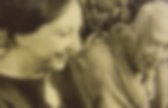

Hudson98. Obituary: Liam Hudson. For the psychologist Liam Hudson, who has died aged 71 from a brain tumour, the personal and professional were inseparable.
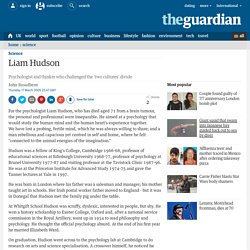
He aimed at a psychology that would study the human mind and the human heart's experience together. Do thoughts have a language of their own? The... - Lapidarium notes. Bertrand Russell, Prologue of Autobiography. The Prologue to Bertrand Russell's Autobiography Three passions, simple but overwhelmingly strong, have governed my life: the longing for love, the search for knowledge, and unbearable pity for the suffering of mankind.
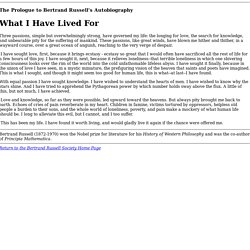
These passions, like great winds, have blown me hither and thither, in a wayward course, over a great ocean of anguish, reaching to the very verge of despair. I have sought love, first, because it brings ecstasy - ecstasy so great that I would often have sacrificed all the rest of life for a few hours of this joy. I have sought it, next, because it relieves loneliness--that terrible loneliness in which one shivering consciousness looks over the rim of the world into the cold unfathomable lifeless abyss. Direct democracy. Direct democracy (also known as pure democracy)[1] is a form of democracy in which people decide (e.g. vote on, form consensus on, etc.) policy initiatives directly, as opposed to a representative democracy in which people vote for representatives who then decide policy initiatives.[2] Depending on the particular system in use, it might entail passing executive decisions, the use of sortition, making laws, directly electing or dismissing officials and conducting trials.
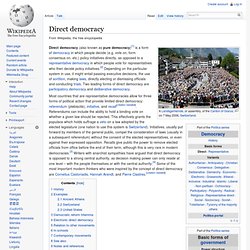
Two leading forms of direct democracy are participatory democracy and deliberative democracy. Most countries that are representative democracies allow for three forms of political action that provide limited direct democracy: referendum (plebiscite), initiative, and recall[citation needed]. Referendums can include the ability to hold a binding vote on whether a given law should be rejected.
History[edit] Chomsky.info : The Noam Chomsky Website. Henry Miller 1891-1980. Anais Nin. 21 February - Anaïs Nin. Anaïs Nin was born 21 February 1903, and died 14 January 1977 Anaïs Nin: Top 15 Quotes I write emotional algebra.The day came when the risk to remain tight in a bud was more painful than the risk it took to blossom.The final lesson a writer learns is that everything can nourish the writer.
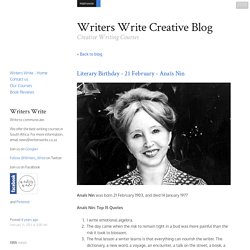
The Act of Creation. The Act of Creation is a 1964 book by Arthur Koestler.
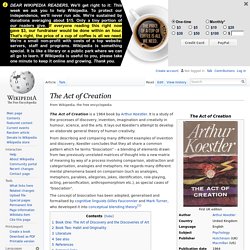
It is a study of the processes of discovery, invention, imagination and creativity in humour, science, and the arts. It lays out Koestler's attempt to develop an elaborate general theory of human creativity. John Berger: ‘Writing is an off-shoot of something deeper’ I have been writing for about 80 years.
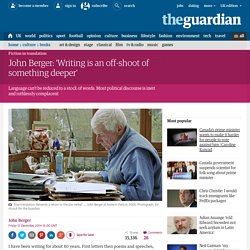
First letters then poems and speeches, later stories and articles and books, now notes. The activity of writing has been a vital one for me; it helps me to make sense and continue. Writing, however, is an off-shoot of something deeper and more general – our relationship with language as such. And the subject of these few notes is language. Let’s begin by examining the activity of translating from one language to another. The conventional view of what this involves proposes that the translator or translators study the words on one page in one language and then render them into another language on another page.
The Frankfurt school, part 4: Herbert Marcuse. When the student generation took off in the 1960s across Europe, in Germany at least it was Herbert Marcuse who had the greatest influence.
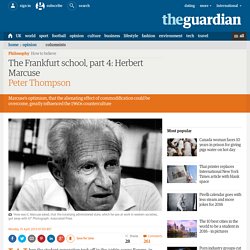
This is because whereas Adorno, with his highly pessimistic philosophical statements about historical development, could talk about a negative progression of humanity from the "slingshot to the megaton bomb", Marcuse continued to maintain a more optimistic view of what could be achieved. Indeed, when 1968 happened, Marcuse said that he was happy to say that all of their theories had been proved completely wrong. Also, Marcuse wrote in a far more accessible way about the ways in which philosophy and politics were intertwined. Bertrand Russell. Bertrand Arthur William Russell was born at Trelleck on 18th May, 1872.
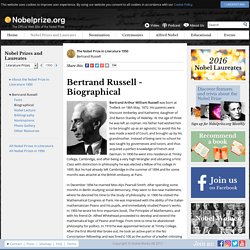
Guardian review: London by Peter Ackroyd. London: The Biography Peter Ackroyd 640pp, Chatto & Windus, £25 Buy it at BOL Here might be found the 'heart of London beating warm'.
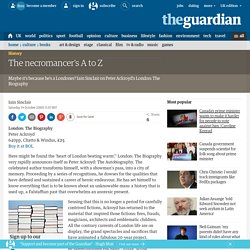
" London: The Biography very rapidly announces itself as Peter Ackroyd: The Autobiography. The celebrated author transforms himself, with a showman's pass, into a city of memory. Proceeding by a series of recognitions, he dowses for the qualities that have defined and sustained a career of heroic endeavour. He has set himself to know everything that is to be known about an unknowable mass: a history that is used up, a Falstaffian past that overwhelms an anorexic present. Theodore Roszak obituary. Theodore Roszak was the first to put a name to the new world of communitarian experiments, cults, spiritual entrepreneurs and competing new-age psychotherapies of San Francisco and Berkeley in the late 1960s, and his label – "counterculture" – stuck.
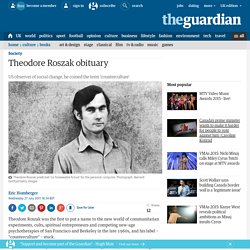
A professor of history at California State University, Roszak, who has died aged 77, was no hippy. A sober, happily married man with a young daughter and a career, he was a perceptive observer of the explosive social changes taking place in the US. Something of a leftist, though no admirer of dogma or orthodoxy, Roszak remained a man of good hope who sought, in a writing career that lasted more than four decades, to ride the new waves of social possibility. In 1968 he edited The Dissenting Academy, a collection of essays attacking the apolitical culture of the humanities in American universities. The Making of a Counter Culture, a finalist for the national book award in 1969, made it clear that Roszak was not merely an anti-war activist.
Angela Davis. Skip to main content. Edward Rutherfurd. BBC Radio 4 - In Our Time, John Ruskin. W. H. D. Rouse. Life[edit] Born in Calcutta, India on 30 May 1863,[1] when the family returned home on leave to Britain Rouse was sent to Regent's Park College in London, where he studied as a lay student. Rossetti Archive. Untitled. Hearing Christopher Ricks speak about his early encounters with the Eng Lit canon, it seems almost inevitable that his career as a literary critic would see him, more than half a century later, the Warren professor of humanities at Boston and professor of poetry at Oxford, having held the King Edward VII professorship at Cambridge.
How many other schoolboys would even have realised, let alone celebrated, their "terrific luck" that two English teachers, both liked and respected, disagreed profoundly as to whether Paradise Lost was any good? And how many others would have reached for Milton's epic as a strategy for dealing with the vicissitudes of school life? "Like many people I sometimes had to protect myself at school, and I did it partly through snobbery," explains Ricks. "And that included thinking that I must be the only person at school who was reading Paradise Lost for pleasure. Ricks follows Paul Muldoon into the Oxford post and Seamus Heaney and James Fenton before him. Literary Encyclopedia. Ivor Armstrong Richards was the most influential literary theorist writing in English in the second and third decades of the twentieth-century. His impact on the teaching of English literature was immense, both through his own writings (mainly Principles of Literary Criticism, 1925; and Practical Criticism, 1929) and through his pupils at Cambridge, of whom only William Empson need be mentioned to illustrate their standing.
Moreover, Richards' discussion of and insistence upon the importance of poetry, by which he often meant literature or, still more generally, “art”, was a controversial but invigorating brief for two generations of writers. Marginalized in literary circles by his work on improvements in … Please log in to consult the article in its entirety. Herbert Read page; anarchist, art critic, novelist (1893-1968): from the Daily Bleed's Anarchist Encyclopedia. Beknighted Anarchist. Born December 4, 1893, Yorkshire, England.
English poet, art critic, anarchist, political philosopher, man of letters, assistant conservator of Victoria & Albert Museum of London, professor of fine arts in Edinburgh & various English universities. Herbert Read became an anarchist after reading Edward Carpenter's booklet Non-Governmental Society (1911). Wrote Anarchy & Order; Poetry & Anarchism (1938); Philosophy of Anarchism (1940); Education & Art (1943); Revolution & Reason (1953); My Anarchism (1966), etc. Samuel Pepys. Samuel Pepys PRS, MP, JP, (/ˈpiːps/;[1] 23 February 1633 – 26 May 1703) was an English naval administrator and Member of Parliament who is now most famous for the diary he kept for a decade while still a relatively young man. Although Pepys had no maritime experience, he rose by patronage, hard work, and his talent for administration to be the Chief Secretary to the Admiralty under both King Charles II and King James II.
His influence and reforms at the Admiralty were important in the early professionalisation of the Royal Navy.[2] The detailed private diary Pepys kept from 1660 until 1669 was first published in the 19th century and is one of the most important primary sources for the English Restoration period. C. Northcote Parkinson, Parkinson's Law (1958) WORK EXPANDS so as to fill the time available for its completion.
General recognition of this fact is shown in the proverbial phrase “It is the busiest man who has time to spare.” GT_Teacher_Toolkit. The Peter & Iona Opie Collection of Folklore and Related Topics IU Lilly Library. Peter and Iona Opie are essentially folklorists working within a tradition of children's literature. The General Theory of Employment, Interest and Money by John Maynard Keynes. John Maynard Keynes (1936) Kenneth Tynan. Dr James Hemming, 1909 - British Humanist Association. Thomas Paine.
Peter Mayle interview: 20 years after A Year In Provence. PROVENCE has “added a dimension of sheer contentment and enrichment” to Peter Mayle’s life – not just for the series of books that have been translated into 28 languages and brought in millions in sales but for its lifestyle, people, customs and gastronomy. Abstracts of the Collected Works of C.G. Jung. Preservation Institute: Beyond Progressive and Conservative.
Obituary: John Kenneth Galbraith. John Kenneth Galbraith was by far the most famous economic thinker of his day. International Erich Fromm Society. Existential Primer: Simone de Beauvoir. Soul on Ice pdf free download. Stuart Hall (cultural theorist) The Wilson Harris Bibliography: An Introduction. Lin Yutang Quotes (Author of The Importance Of Living) Maya Angelou (1928-2014)